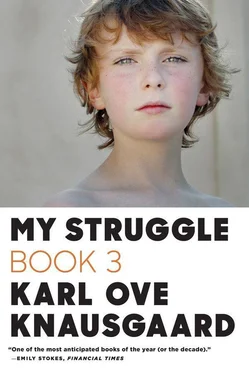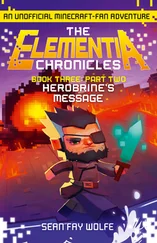Dad got up.
“No, I can’t watch this,” he said. “How can they show this on TV on a Monday night!”
“Can I watch it anyway?” I said.
“Yes, of course,” he said, heading for the staircase.
The membrane at the bottom was pulsating. Blood streamed over it, and it sent the blood back, then seemed to rise, until the blood washed across again and once more it had to send it back and once more it had to rise.
Suddenly I realized this was a heart I was watching.
How incredibly sad.
Not because the heart was beating and couldn’t escape, it wasn’t that. The point was that the heart should not be seen, it should be allowed to beat in secret, hidden from our sight, it was obvious, you understood that when you saw it, a little animal without eyes, it should pound and throb inside your chest unseen.
But I kept watching. Medical programs were my favorite on TV, and especially the few that showed operations. A long time ago I had decided I would be a surgeon when I grew up. Mom and Dad sometimes mentioned this to others, it was intended to be amusing because I’d said it when I was so small, but I really meant it, that was what I wanted to do when I grew up, cut up other people and perform operations on them. I often did drawings or paintings of operations with blood and knives and nurses and lamps, and Mom had asked me many times why I drew and painted so much blood, why couldn’t I choose something else, houses and grass and sun, for example, and that was fine by me, but it wasn’t what I wanted to do. Divers, sailing ships, rockets, and operations, they were what I wanted to draw and paint, not houses and grass and sun.
When Yngve was very small and they lived in Oslo he had said he wanted to be a garbage collector when he grew up. Grandma laughed a lot about that and often mentioned it. In the same breath she said Dad had wanted to be an odd job man when he was small. She laughed just as much about that, sometimes so much tears rolled down her cheeks, even though she must have said it a hundred times. My wanting to become a surgeon wasn’t funny in the same way, it carried a different message, but then I was also a lot older than Yngve had been when he said he wanted to be a garbage collector.
Step by step all the clips and tubes were removed from the shaft in the body. Then the host of the show came on camera and talked about what we had just seen. I got up and went back into the kitchen, where the scones were cooling down on the tray on top of the stove, a pan of hot water for tea was steaming beside them, and Mom was setting the table with plates, cups, knives, and a variety of spreads.
The next day the temperature had fallen and the rain had stopped. My winter boots from last year were too small, and Mom found some woolen socks I could wear inside my rubber boots instead. The blue Puffa jacket still fit, so I wore that for the first time since last year. And then, as soon as I was out of the house, there was a blue bobble cap that I pulled down so far over my face that it formed a black ceiling to my vision. Anne Lisbet was wearing a light-blue Puffa jacket, in smooth, shiny material, unlike mine, which was coarse and matte, a white cap from which her black hair protruded, a white scarf, blue trousers, and a brand-new pair of red boots. She was standing with some girls and didn’t return my gaze when I looked at them.
The color of her jacket was just incredibly attractive.
I wanted one like it.
When we got to school and everyone had left their satchels in a line, I suggested to Geir that we steal their caps. He would take Solveig’s and I would take Anne Lisbet’s. She was standing with her back to us, and when I grabbed it, she whirled around with a scream. I waited until her eyes met mine, and then I ran off. I didn’t run so fast that she couldn’t catch me or so slowly that everyone would see I was waiting.
I could hear her footsteps on the tarmac behind me.
And then she wrapped her arms around me.
Oh! Oh! Oh!
Her wonderfully thick down jacket pressed against mine, she smiled, and shouted, Let me have it, let me have it, and I simply couldn’t drag the moment out any longer by holding the cap high above her head, the joy inside me was too strong, I just gave it to her and stood still and watched her put it on her head and walk away.
Then she turned and smiled at me!
And her eyes, oh, her eyes, so black and beautiful, they were gleaming! It was like entering a zone of shining light against which everything outside paled and lost meaning. The bell rang, we marched up the stairs, along the corridor, sat down at our desks, and took out our books. And I did what we were told, listened when we had to listen, chatted away as usual, drew my sunken wrecks and swimming frogmen, ate my packed lunch and drank my milk, played soccer at recess, sat beside Geir, and sang in the bus on the way home, ran through the flock of children with my satchel hanging off my back down the last hill, present in both body and soul, yet absent, because inside me there suddenly existed a new sky under whose vaults even the most familiar of thoughts and actions appeared new.
When we went to see Anne Lisbet that day she was standing in the middle of a crowd of kids on the cul-de-sac outside her house. Two of them were swinging a rope between them like a machine, it lashed the ground like a whip, and one after the other they slipped in, stood, and jumped up and down a few times, then slipped out, so that the next person could step in. She was wearing the same cap and the same scarf, and she smiled at us as we stopped in front of them.
“Join in, come on!” she said.
We got in line. I wanted to impress her so much, just slip into the spinning corridor the rope drew in the air, but I didn’t manage more than two jumps before it hit my calf and I was out. Strangely, Geir, whose motor control was not that great and whose arms and legs flapped about wildly, managed very well. Jump, jump, jump, jump, jump — and then he hurled himself out with such force and determination that he had to take a few extra steps to prevent himself from stumbling, not dissimilar to a runner throwing himself at the tape.
Now she would think that Geir was better than me.
The somberness of that thought was gone the very next moment because it was her turn. She ran in and danced inside the rope, an absolute virtuoso, her weight was first on one leg, then on the other while she stared straight ahead, as though her head had nothing to do with what her body was doing. But as she jumped out, no longer needing to concentrate, it was me she looked at and sent a smile to. Did you see that? her smile said. Did you see me just now?
The water covering the largest sunken areas of the cul-de-sac where we were standing was almost yellow. In the smaller puddles it was a greenish gray, like the surrounding gravel, only a shade lighter. And shinier, of course. From the forest below came the babbling of a stream. The drone of a machine was also audible. I had never been there before, and walked over to the edge to look down. From the house above me on the edge of the forest, a broad, rocky slope fell away sharply. Beneath it there was a yellow bog. Behind that, pines huddled together. Between the trunks I could see a green workmen’s shed and a yellow generator. That was what was making the noise.
Then some drilling started. I couldn’t see who was doing it, but the sound, such a monotonous rat-a-tat-tat, with that brittle, almost singing tone of metal on rock lying like a veil over it, was unmistakable. I knew it through and through.
I turned back and saw Geir nodding his head in time with the rope to adapt to the rhythm for his turn. But this time he didn’t do so well, his foot got tangled at once, and as the two rope swingers resumed their mechanical motions, he shuffled over toward me. Behind him Anne Lisbet slipped in. But as soon as she was in position the rope hit her on the arm. She seemed almost to have done it on purpose.
Читать дальше












